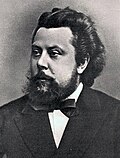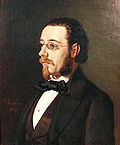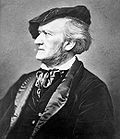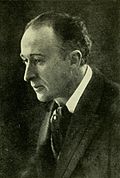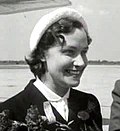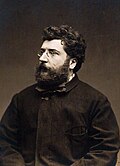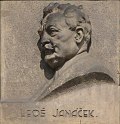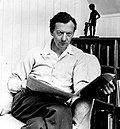Portal:Opera/Selected biography
Instructions
The layout design for these subpages is at Portal:Opera/Selected biography/Layout.
- Add a new Selected article to the next available subpage.
- The list should only contain articles that have been given a quality rating of B-class or higher.
- The "blurb" for all selected articles should be approximately 10 lines, for appropriate formatting in the portal main page.
- Update "max=" to new total for its {{Random portal component}} on the main page.
Selected biographies list
Portal:Opera/Selected biography/1
Portal:Opera/Selected biography/2
Professor Erik William Chisholm (4 January 1904 – 8 June 1965) was a Scottish composer and conductor often known as "Scotland’s forgotten composer". According to his biographer, Chisholm "was the first composer to absorb Celtic idioms into his music in form as well as content, his achievement paralleling that of Bartók in its depth of understanding and its daring", which led to his nickname of "MacBartók". He was also a founder of the Celtic Ballet and, together with Margaret Morris, created the first full-length Scottish ballet, The Forsaken Mermaid. He was also the dean and director of the South African College of Music at the University of Cape Town for 19 years. Chisholm founded the South African College of Music opera company in Cape Town and was a vital force in bringing new operas to Scotland, England and South Africa. By the time of his death in 1965, he had composed over a hundred works.
Portal:Opera/Selected biography/3
Portal:Opera/Selected biography/4
Rutland Barrington (15 January 1853 – 31 May 1922) was an English singer, actor, comedian, and Edwardian musical comedy star. Best remembered for originating the lyric baritone roles in the Gilbert and Sullivan operas from 1877 to 1896, his performing career spanned more than four decades. He also wrote at least a dozen works for the stage. After two years with a comic touring company, Barrington joined Richard D'Oyly Carte's opera company and, over the next two decades, created a number of memorable comic opera roles, including Captain Corcoran in H.M.S. Pinafore (1878), the Sergeant of Police in The Pirates of Penzance (1880), and Pooh Bah in The Mikado (1885), among many others. Failing in an 1888 attempt to become a theatrical manager, Barrington refocused his energies on acting and occasional playwriting. Beginning in 1896 and continuing for ten years, Barrington played in a series of very successful musical comedies under the management of George Edwardes at Daly's Theatre. After leaving Daly's he continued to appear in musical comedy roles and performed in music hall. His career ended in 1918, after which he suffered a stroke and lived the last few years of his life in poverty.
Portal:Opera/Selected biography/5
Sir
Portal:Opera/Selected biography/6
Jessie Bond (10 January 1853 – 17 June 1942) was an English singer and actress best known for creating the mezzo-soprano soubrette roles in the Gilbert and Sullivan comic operas. She spent twenty years on the stage, the bulk of them with the D'Oyly Carte Opera Company. Bond began a concert singing career in Liverpool by 1870, after which, at the age of 17, she entered into a brief, unhappy marriage. After leaving her abusive husband, she continued her concert career and studied at the Royal Academy of Music. At the age of 25, Bond began her theatrical career, creating the role of Cousin Hebe in Gilbert and Sullivan's H.M.S. Pinafore. After this, she created roles of increasing importance with the D'Oyly Carte Opera Company in a series of successful comic operas, including the title role in Iolanthe (1882), Pitti Sing in The Mikado (1885), and others. During the 1890s, she continued performing on the West End, while being courted by Lewis Ransome, a civil engineer. In 1897, at the age of 44, Bond married Ransome and left the stage. They were happily married for 25 years; however, she survived Ransome by twenty years, living to the age of 89.
Portal:Opera/Selected biography/7
Portal:Opera/Selected biography/8
, was initially highly successful, but it has been little heard since his death.
Portal:Opera/Selected biography/9
Portal:Opera/Selected biography/10
. However, while Mussorgsky's music can be vivid and nationalistic, it does not always glorify the powerful and is sometimes antimilitaristic, such as in The Field-Marshal. For many years Mussorgsky's works were mainly known in versions revised or completed by other composers. Many of his most important compositions have recently come into their own in their original forms, and some of the original scores are now also available.
Portal:Opera/Selected biography/11
Karlheinz Stockhausen (22 August 1928 – 5 December 2007) was a German composer, widely acknowledged by critics as one of the most important but also controversial composers of the twentieth and early twenty-first centuries. Some of his notable compositions include the series of nineteen Klavierstücke (Piano Pieces), Kontra-Punkte for ten instruments, the electronic/musique-concrète Gesang der Jünglinge, Gruppen for three orchestras, the percussion solo Zyklus, Kontakte, the cantata Momente, the live-electronic Mikrophonie I, Hymnen, Stimmung for six vocalists, Aus den sieben Tagen, Mantra for two pianos and electronics, Tierkreis, Inori for soloists and orchestra, and the gigantic opera cycle Licht.
Portal:Opera/Selected biography/12
Portal:Opera/Selected biography/13
Pyotr Ilyich Tchaikovsky (7 May 1840–6 November 1893) was a Russian composer of the Romantic era. He wrote some of the most popular concert and theatrical music in the current classical repertoire, including the ballets Swan Lake and The Nutcracker, the 1812 Overture, his First Piano Concerto, several symphonies, and ten operas of which Eugene Onegin and The Queen of Spades are the most well-known. Although he enjoyed many popular successes, he was never emotionally secure, and his life was punctuated by personal crises and periods of depression. Contributory factors were his suppressed homosexuality and fear of exposure, his disastrous marriage, and the sudden collapse of the one enduring relationship of his adult life, his 13-year association with the wealthy widow Nadezhda von Meck.
Portal:Opera/Selected biography/14
Portal:Opera/Selected biography/15
Portal:Opera/Selected biography/16
Portal:Opera/Selected biography/17
Frederick Theodore Albert Delius CH (29 January 1862 – 10 June 1934) was an English composer. Born in Bradford, Yorkshire, to a prosperous mercantile family of German extraction, he resisted attempts to recruit him to commerce. He was sent to Florida in 1884 to manage an orange plantation, where he neglected his managerial duties. Influenced by African-American music, he began composing. After a brief period of formal musical study in Germany beginning in 1886, he embarked on a full-time career as a composer in Paris and then in nearby Grez-sur-Loing, where he and his wife Jelka lived (except during the First World War) for the rest of their lives. Delius's first successes came in Germany. In Delius's native Britain, it was 1907 before his music made regular appearances in concert programmes, after Thomas Beecham took it up. Beecham staged Delius's opera A Village Romeo and Juliet at Covent Garden in 1910 and mounted a six-day Delius festival in London in 1929, as well as making gramophone recordings of many of Delius's works. After 1918 Delius began to suffer the effects of syphilis, contracted during his earlier years in Paris. He became paralysed and blind, but completed some late compositions between 1928 and 1932 with the aid of an amanuensis.
Portal:Opera/Selected biography/18
Portal:Opera/Selected biography/19
Portal:Opera/Selected biography/20
Portal:Opera/Selected biography/21
Portal:Opera/Selected biography/22
Sir Charles Villiers Stanford (30 September 1852 – 29 March 1924) was an Irish composer, teacher and conductor. Born to a well-off and highly musical family in Dublin, Stanford was educated at the University of Cambridge before studying music in Leipzig and Berlin. In 1882, aged 29, he became one of the founding professors of the Royal College of Music, where he taught composition for the rest of his life. From 1887 he was also the professor of music at Cambridge. Stanford composed a substantial number of concert works, including seven symphonies, but his best-remembered pieces are his choral works for church performance, chiefly composed in the Anglican tradition. He was a dedicated composer of opera, but none of his nine completed operas which included The Canterbury Pilgrims and Much Ado About Nothing has endured in the general repertory. Some critics regarded Stanford, together with Hubert Parry and Alexander Mackenzie, as responsible for a renaissance in English music. However, after his conspicuous success as a composer in the last two decades of the 19th century, his music was eclipsed in the 20th century by that of Edward Elgar as well as his former pupils.
Portal:Opera/Selected biography/23
Portal:Opera/Selected biography/24
Portal:Opera/Selected biography/25
Portal:Opera/Selected biography/26
Portal:Opera/Selected biography/27
Benjamin Britten (22 November 1913 – 4 December 1976) was an English composer, conductor and pianist. He was a central figure of 20th-century British classical music, with a range of works including opera, other vocal music, orchestral and chamber pieces. His best-known works include the opera Peter Grimes (1945), the War Requiem (1962) and the orchestral showpiece The Young Person's Guide to the Orchestra (1945). Born in Suffolk, the son of a dentist, Britten showed talent from an early age. He studied at the Royal College of Music in London and privately with the composer Frank Bridge. Britten first came to public attention with the a cappella choral work A Boy Was Born in 1934. With the premiere of Peter Grimes in 1945, he leapt to international fame. Over the next 28 years, he wrote 14 more operas, establishing himself as one of the leading 20th-century composers in the genre. In addition to large-scale operas for Sadler's Wells and Covent Garden, he wrote "chamber operas" for small forces, suitable for performance in venues of modest size. Among the best known of these is The Turn of the Screw (1954). Recurring themes in the operas are the struggle of an outsider against a hostile society, and the corruption of innocence.
Portal:Opera/Selected biography/28
Sir Michael Kemp Tippett (2 January 1905 – 8 January 1998) was an English composer who rose to prominence during and immediately after the Second World War. In his lifetime he was considered to rank with his contemporary Benjamin Britten as one of the leading British composers of the 20th century. Among his best-known works are the opera The Midsummer Marriage and the oratorio A Child of Our Time inspired by Kristallnacht (pictured), the Nazi government's violent pogrom against its Jewish population. Having briefly embraced communism in the 1930s, Tippett avoided identifying with any political party. A pacifist after 1940, he was imprisoned in 1943 for refusing to carry out war-related duties required by his military exemption. His initial difficulties in accepting his homosexuality led him in 1939 to Jungian psychoanalysis; the Jungian dichotomy of "shadow" and "light" remained a recurring factor in Tippett's music. He was a strong advocate of music education, and was active for much of his life as a radio broadcaster and writer on music.
Portal:Opera/Selected biography/29
Patrice Chéreau (2 November 1944 – 7 October 2013) was a French opera and theatre director, filmmaker, actor and producer. In France he is best known for his work for the theatre, internationally for his films
Portal:Opera/Selected biography/30
André Charles Prosper Messager (30 December 1853 – 24 February 1929) was a French composer, organist, pianist, conductor and administrator. His stage compositions included ballets and 30
Portal:Opera/Selected biography/31
Wystan Hugh Auden (21 February 1907 – 29 September 1973), who published as W. H. Auden, was an Anglo-American poet, born in England, later an American citizen, and is regarded by many critics as one of the greatest writers of the 20th century. His work is noted for its stylistic and technical achievement, its engagement with moral and political issues, and its variety in tone, form and content. The central themes of his poetry are love, politics and citizenship, religion and morals, and the relationship between unique human beings and the anonymous, impersonal world of nature. Auden took a particular interest in writing opera librettos, a form ideally suited to direct expression of strong feelings. He wrote the libretto for Britten's operetta Paul Bunyan and with Chester Kallman co-wrote the librettos for Stravinsky's The Rake's Progress, Nicolas Nabokov's Love's Labour's Lost, and two operas by Hans Werner Henze—Elegy for Young Lovers and The Bassarids.
Portal:Opera/Selected biography/32
Jules Émile Frédéric Massenet 12 May 1842 – 13 August 1912) was a French composer best known for his operas, of which he wrote more than thirty. The two most frequently staged are
Portal:Opera/Selected biography/33
François Lay, better known under the stage name Lays (14 February 1758 – 30 March 1831), was a French baritone and tenor opera singer. Originally destined for a career in the church, he was recruited by the Paris Opéra in 1779 and soon became a leading member of the company, in spite of quarrels with the management. Lays enthusiastically welcomed the French Revolution and became involved in politics with the encouragement of his friend Bertrand Barère. Barère's downfall led to Lays being imprisoned briefly, but he soon won back the public and secured the patronage of Napoleon, at whose coronation and second wedding he sang. His association with the Emperor caused him trouble when the Bourbon monarchy was restored and Lays's final years were darkened by disputes over his pension, mounting debts, the death of his only son and his wife's illness. After a career spanning more than four decades, he died in poverty.
Portal:Opera/Selected biography/34
Portal:Opera/Selected biography/35
Gioachino Antonio Rossini (29 February 1792 – 13 November 1868) was an Italian composer who gained fame for his 39 operas, although he also wrote many songs, some
Portal:Opera/Selected biography/36
Portal:Opera/Selected biography/37
Portal:Opera/Selected biography/38
Portal:Opera/Selected biography/39
Nominations
- Adding articles
- Feel free to add Good articlesto the above list.
- If you are unsure or do not know how to add an entry, feel free to post a question, suggestion or nomination here below, or at the talk page Portal talk:Opera.










